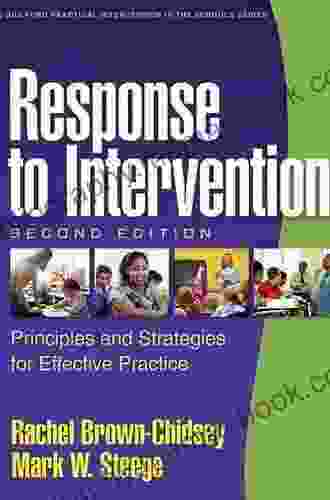Reverse Psychology: Whatever You Do, Don't Read This!

The Art of Persuasion in Reverse
Reverse psychology is a fascinating psychological phenomenon that involves influencing someone to do the opposite of what you want them to do by suggesting the opposite. It's a technique that has been used for centuries, often in a humorous or manipulative way. But can reverse psychology be used effectively in persuasion and influence? Let's explore this intriguing concept and its implications in various domains.
4 out of 5
| Language | : | English |
| File size | : | 69 KB |
| Text-to-Speech | : | Enabled |
| Screen Reader | : | Supported |
| Enhanced typesetting | : | Enabled |
| Word Wise | : | Enabled |
| Print length | : | 18 pages |
Historical Roots of Reverse Psychology
The concept of reverse psychology has its roots in ancient Greek philosophy. The philosopher Socrates famously used a form of reverse psychology to teach his students by asking them leading questions that would eventually lead them to the correct answer. In the 20th century, the psychologist William James proposed the idea of "contrary suggestion," which suggests that people often have an impulse to do the opposite of what they are told.
Ethical Considerations
When considering using reverse psychology, it's crucial to approach it with ethical considerations in mind. Reverse psychology should not be used to manipulate or deceive others. Instead, it should be used in a way that respects the other person's autonomy and well-being.
In general, it's best to use reverse psychology sparingly and only in situations where you believe the other person is willing to engage in the playful banter. If you're unsure whether reverse psychology is appropriate in a given situation, it's always better to err on the side of caution.
Applications of Reverse Psychology
Reverse psychology can be a useful tool in various domains, including:
Marketing
In marketing, reverse psychology can be used to create a sense of urgency or scarcity. By suggesting that a product is limited edition or running out, marketers can evoke a fear of missing out and encourage consumers to make a purchase.
Relationships
In relationships, reverse psychology can be used to playfully challenge a partner or friend to do something they might not otherwise consider. For example, a partner might jokingly say, "I bet you don't have the courage to try that new restaurant," which could encourage the other person to accept the challenge.
Communication
In communication, reverse psychology can be used to break the ice or defuse a tense situation. By making a self-deprecating joke or saying something deliberately provocative, you can create an atmosphere of levity and open up the conversation.
Body Language
Body language can also be used to convey reverse psychology. For example, crossing your arms might indicate resistance or disagreement, but it could also subtly suggest that you're open to hearing more. Similarly, maintaining eye contact can convey interest, but breaking eye contact could indicate that you're disinterested, which might encourage the other person to engage more.
Emotional Intelligence
Understanding reverse psychology can enhance your emotional intelligence. By being aware of this phenomenon, you can better understand how others might react to your words or actions and adjust your communication accordingly.
Examples of Reverse Psychology
Here are a few anecdotal examples of reverse psychology in action:
- A parent might tell their child, "I don't want you to clean your room," knowing that the child will likely do it to prove them wrong.
- A teacher might tell a student, "I'm sure you won't be able to pass this test," which could motivate the student to study harder.
- A friend might challenge you to a game, saying, "I'm going to beat you so badly," which could make you more determined to win.
- A salesperson might tell a customer, "This product is not for everyone," which could pique their curiosity and make them more interested in purchasing it.
- A public speaker might start their presentation by saying, "I'm a terrible speaker," which could disarm the audience and make them more receptive to their message.
Reverse psychology is a complex and intriguing psychological phenomenon that can be used effectively in various domains, from marketing to relationships to communication. However, it's essential to approach reverse psychology with ethical considerations in mind and to use it sparingly and respectfully. By understanding the dynamics of reverse psychology, individuals can gain valuable insights into the art of persuasion and influence.
So, now that you've read this article, what will you do? Will you embrace the power of reverse psychology, or will you resist its allure? The choice is yours. Just remember, whatever you do, don't do the opposite!
4 out of 5
| Language | : | English |
| File size | : | 69 KB |
| Text-to-Speech | : | Enabled |
| Screen Reader | : | Supported |
| Enhanced typesetting | : | Enabled |
| Word Wise | : | Enabled |
| Print length | : | 18 pages |
Do you want to contribute by writing guest posts on this blog?
Please contact us and send us a resume of previous articles that you have written.
 Top Book
Top Book Novel
Novel Fiction
Fiction Nonfiction
Nonfiction Literature
Literature Paperback
Paperback Hardcover
Hardcover E-book
E-book Audiobook
Audiobook Bestseller
Bestseller Classic
Classic Mystery
Mystery Thriller
Thriller Romance
Romance Fantasy
Fantasy Science Fiction
Science Fiction Biography
Biography Memoir
Memoir Autobiography
Autobiography Poetry
Poetry Drama
Drama Historical Fiction
Historical Fiction Self-help
Self-help Young Adult
Young Adult Childrens Books
Childrens Books Graphic Novel
Graphic Novel Anthology
Anthology Series
Series Encyclopedia
Encyclopedia Reference
Reference Guidebook
Guidebook Textbook
Textbook Workbook
Workbook Journal
Journal Diary
Diary Manuscript
Manuscript Folio
Folio Pulp Fiction
Pulp Fiction Short Stories
Short Stories Fairy Tales
Fairy Tales Fables
Fables Mythology
Mythology Philosophy
Philosophy Religion
Religion Spirituality
Spirituality Essays
Essays Critique
Critique Commentary
Commentary Glossary
Glossary Bibliography
Bibliography Index
Index Table of Contents
Table of Contents Preface
Preface Introduction
Introduction Foreword
Foreword Afterword
Afterword Appendices
Appendices Annotations
Annotations Footnotes
Footnotes Epilogue
Epilogue Prologue
Prologue P J Douglas
P J Douglas Adam Clay
Adam Clay Sergei Dovlatov
Sergei Dovlatov Douglas Reeves
Douglas Reeves James Munro
James Munro Amy Ratcliffe
Amy Ratcliffe Anna Castor
Anna Castor Suzuki Tanaka
Suzuki Tanaka Sara Binatti Dos Anjos
Sara Binatti Dos Anjos Brandon Hatton
Brandon Hatton Eiichiro Oda
Eiichiro Oda Ginny Owens
Ginny Owens Janet Dawson
Janet Dawson Marneen L Fields
Marneen L Fields Jillian Ventrone
Jillian Ventrone Michelle Zauner
Michelle Zauner Abby Rosmarin
Abby Rosmarin K F Riley
K F Riley Abbi Waxman
Abbi Waxman Judith Carter
Judith Carter
Light bulbAdvertise smarter! Our strategic ad space ensures maximum exposure. Reserve your spot today!

 John SteinbeckNatural Born King: One Piece Graphic Novel - A Journey into the Heart of...
John SteinbeckNatural Born King: One Piece Graphic Novel - A Journey into the Heart of...
 Harvey BellUnveiling the "100 Million Berry Man": A Comprehensive Exploration of the One...
Harvey BellUnveiling the "100 Million Berry Man": A Comprehensive Exploration of the One... Jordan BlairFollow ·16.7k
Jordan BlairFollow ·16.7k Quincy WardFollow ·12.2k
Quincy WardFollow ·12.2k Bradley DixonFollow ·13.1k
Bradley DixonFollow ·13.1k Robert BrowningFollow ·4.4k
Robert BrowningFollow ·4.4k Bobby HowardFollow ·9.6k
Bobby HowardFollow ·9.6k Miguel NelsonFollow ·2.5k
Miguel NelsonFollow ·2.5k George Bernard ShawFollow ·12.5k
George Bernard ShawFollow ·12.5k Eugene ScottFollow ·3.7k
Eugene ScottFollow ·3.7k

 Patrick Rothfuss
Patrick RothfussHow to Make a Million Dollars: No Secrets
Making a million dollars...

 Robert Heinlein
Robert HeinleinResponse to Intervention, Second Edition: RTI in Practice
A Comprehensive Resource for Educators and...

 Timothy Ward
Timothy WardUnravel the Gripping Assassination Thriller Bursting with...
Prepare yourself for a...
4 out of 5
| Language | : | English |
| File size | : | 69 KB |
| Text-to-Speech | : | Enabled |
| Screen Reader | : | Supported |
| Enhanced typesetting | : | Enabled |
| Word Wise | : | Enabled |
| Print length | : | 18 pages |














